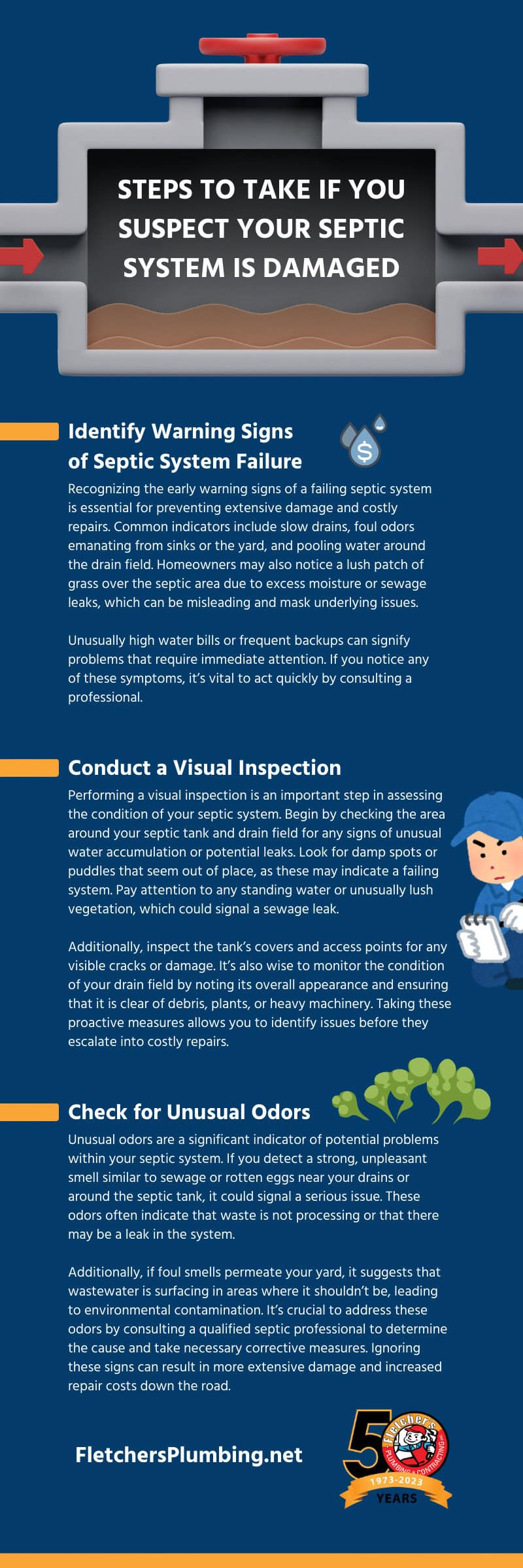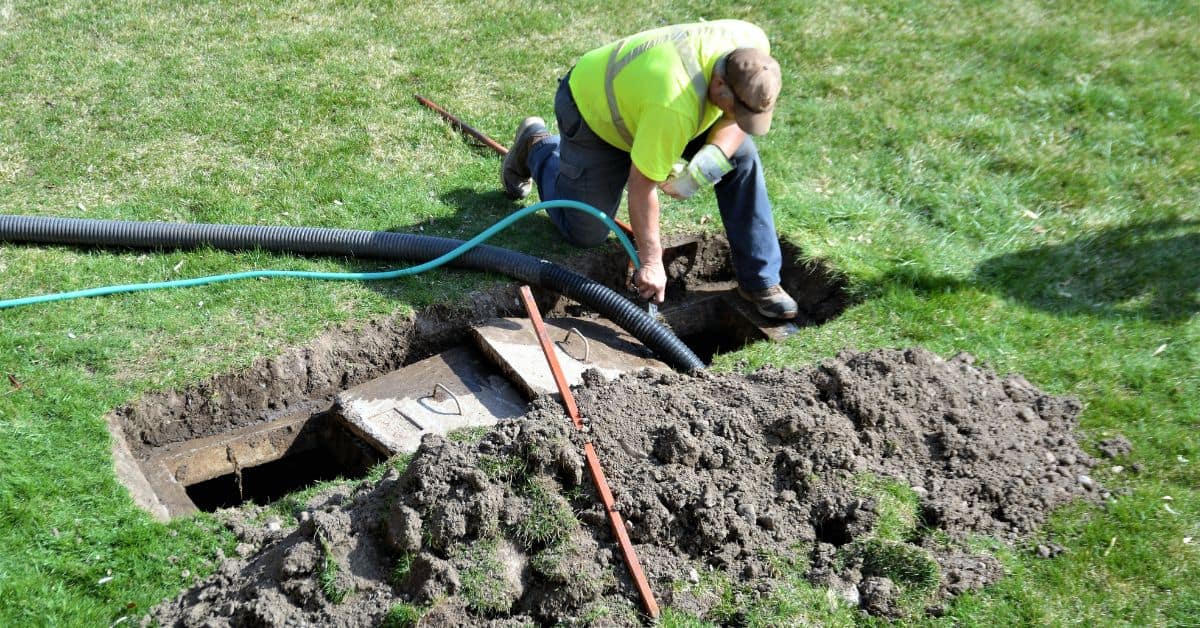7 Steps To Take if You Suspect Your Septic System Is Damaged
When it comes to maintaining a healthy home, one of the most crucial aspects is the proper functioning of your septic system. A damaged septic system can lead to significant health risks, environmental hazards, and costly repairs. Unfortunately, many homeowners are unaware of the warning signs that indicate potential damage, and their inaction can exacerbate the problem over time.
Let’s look at seven steps to take if you suspect your septic system is damaged and some tips for preventing further damage.
Identify Warning Signs of Septic System Failure
Recognizing the early warning signs of a failing septic system is essential for preventing extensive damage and costly repairs. Common indicators include slow drains, foul odors emanating from sinks or the yard, and pooling water around the drain field. Homeowners may also notice a lush patch of grass over the septic area due to excess moisture or sewage leaks, which can be misleading and mask underlying issues.
Unusually high water bills or frequent backups can signify problems that require immediate attention. If you notice any of these symptoms, it’s vital to act quickly by consulting a professional. Timely diagnosis and intervention can save you from severe disruptions and maintain the integrity of your property’s wastewater management system.
Conduct a Visual Inspection
Performing a visual inspection is an important step in assessing the condition of your septic system. Begin by checking the area around your septic tank and drain field for any signs of unusual water accumulation or potential leaks. Look for damp spots or puddles that seem out of place, as these may indicate a failing system. Pay attention to any standing water or unusually lush vegetation, which could signal a sewage leak.
Additionally, inspect the tank’s covers and access points for any visible cracks or damage. It’s also wise to monitor the condition of your drain field by noting its overall appearance and ensuring that it is clear of debris, plants, or heavy machinery. Taking these proactive measures allows you to identify issues before they escalate into costly repairs.
Check for Unusual Odors
Unusual odors are a significant indicator of potential problems within your septic system. If you detect a strong, unpleasant smell similar to sewage or rotten eggs near your drains or around the septic tank, it could signal a serious issue. These odors often indicate that waste is not processing or that there may be a leak in the system.
Additionally, if foul smells permeate your yard, it suggests that wastewater is surfacing in areas where it shouldn’t be, leading to environmental contamination. It’s crucial to address these odors by consulting a qualified septic professional to determine the cause and take necessary corrective measures. Ignoring these signs can result in more extensive damage and increased repair costs down the road.
Test Drainage and Flushing Systems
Testing your drainage and flushing systems is a critical step in identifying potential septic system issues. Begin by running water in various fixtures throughout your home, such as sinks, toilets, and showers, to observe the drainage efficiency. Pay close attention to any slow drains or gurgling sounds that may indicate blockages or issues in the pipes.
Additionally, flush toilets and monitor how quickly the water refills; prolonged flushing times or backups can signal trouble. It’s also important to examine any sewage ejector pumps if your system includes them, ensuring they operate correctly. Regular tests of drainage and flushing do more than help you catch problems early; they allow you to monitor and maintain the overall functionality and longevity of your septic system.
Document Your Findings
Keeping a detailed record of your observations and inspections is crucial for managing your septic system effectively. Begin by noting the dates and specifics of any unusual signs, such as odors or drainage issues, as well as the results of your visual inspections. Document the professionals you consult, the professional recommendations or findings you receive, and any repairs made.
This log will not only help you track recurring problems but also provide valuable information should a professional need to assess your system’s condition later on. Additionally, maintaining a record of regular maintenance, such as pump-outs or inspections, can aid in extending the lifespan of your septic system. A well-documented history can ultimately save time and money and prevent further complications.
Contact a Professional for Assessment
When you suspect issues with your septic system, it’s essential to contact a professional for a thorough assessment. Certified septic service providers possess the expertise and tools necessary to evaluate the health of your system accurately. They can perform comprehensive inspections, including checking the tank’s condition, testing the drainage field, and using specialized cameras to identify blockages or leaks in the pipes.
A professional assessment not only provides peace of mind but also aids in determining the best course of action for repairs or maintenance. Furthermore, they can offer insights into proper septic system care, helping to prevent future issues and ensuring the longevity of your wastewater management system. Timely intervention can prevent costly repairs and serious health risks associated with septic failures.
Consider Preventative Maintenance Strategies
Preventative maintenance strategies are essential for ensuring the proper functioning of your septic system and prolonging its lifespan. Regular inspections and pump-outs are vital. Professionals typically recommend these services every three to five years, depending on your system’s size and usage. Additionally, limiting water usage can help prevent overload, reducing the risk of backups and failures.
Be mindful of what goes down your drains; avoid flushing non-biodegradable items and harsh chemicals that can disrupt the natural balance of bacteria in the tank. Incorporating water-saving fixtures and appliances can also significantly reduce wastewater production. Educating all household members about septic system care contributes to a healthier environment and a more efficient system, ultimately saving you from costly repairs and potential health hazards.
Maintaining the health of your septic system is crucial for safeguarding your home and the environment. By recognizing warning signs, conducting thorough inspections, and implementing preventative maintenance strategies, you can mitigate the risk of costly repairs and health hazards. Remember that regular communication with septic professionals is vital for accurate assessments and effective solutions. By taking proactive measures, you can ensure the longevity and functionality of your septic system, allowing you to enjoy peace of mind while protecting your property and the surrounding ecosystem.
If you need septic tank plumbers in California, Fletcher’s Plumbing & Contracting can help you. Contact them today to schedule an appointment or learn more about their septic services.


